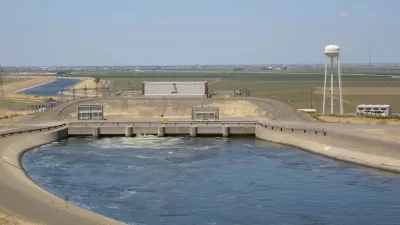California's landmark climate legislation, AB 32, ends in five years; i.e., the target year for emissions reduction is 2020, after which there will be no comparable legislation targeting a future year. SB 32 sets emission reduction goals for 2050.
"The principal author of [the 2006 climate legislation, AB 32], Sen. Fran Pavley, D-Agoura Hills, has introduced a new bill, SB 32, requiring greenhouse gases to be cut to 80 percent below the 1990 levels by 2050," writes John Howard, editor of Capitol Weekly. "The plan would come under the jurisdiction of the [California] Air Resources Board [CARB]."
California will have met the goals of AB 32 if by 2020 emissions are no greater than 1990 levels. Setting the target at 80 percent below 1990 will clearly be a tough row to hoe, "all but certain to draw national attention," writes Howard. It would "authorize state air quality regulators to establish interim benchmarks in 2030 and 2040 to make sure the reductions are actually taking place."
"The lack of post-2020 certainties has been cited as a restraining factor on investments in several areas of the [cap-and-trade] program, such as speculative participation by major financial institutions, and offset project activity for which returns are cast over a long-term horizon," according to CaliforniaCarbon.
Asked if Gov. Jerry Brown has taken a position on the bill, his spokesman stated, “While we generally do not comment on pending legislation, we continue to support strong, sustained action on climate change."
The bill's target is the same as 2005 Executive Order [S-3-05] issued by then-Governor Schwarzenegger who also signed AB 32. That executive order was also referenced in a successful lawsuit on the environmental impact report (EIR) on the sustainable communities strategy of the San Diego Association of Governments' (SANDAG), a requirement under SB 375.
Addendum:
- Regarding AB 32, Howard notes that "(t)he final law carried the name of then-Assembly Speaker Fabian Núñez, although Pavley was its original author.
- SB 1125, detailed by Planetizen in a February 2014 post, "Successor Bill to California's Landmark Climate Change Legislation Introduced," was not approved by the State Legislature.
FULL STORY: Major new cuts eyed for greenhouse gases

Alabama: Trump Terminates Settlements for Black Communities Harmed By Raw Sewage
Trump deemed the landmark civil rights agreement “illegal DEI and environmental justice policy.”

Study: Maui’s Plan to Convert Vacation Rentals to Long-Term Housing Could Cause Nearly $1 Billion Economic Loss
The plan would reduce visitor accommodation by 25% resulting in 1,900 jobs lost.

Planetizen Federal Action Tracker
A weekly monitor of how Trump’s orders and actions are impacting planners and planning in America.

Wind Energy on the Rise Despite Federal Policy Reversal
The Trump administration is revoking federal support for renewable energy, but demand for new projects continues unabated.

Passengers Flock to Caltrain After Electrification
The new electric trains are running faster and more reliably, leading to strong ridership growth on the Bay Area rail system.

Texas Churches Rally Behind ‘Yes in God’s Back Yard’ Legislation
Religious leaders want the state to reduce zoning regulations to streamline leasing church-owned land to housing developers.
Urban Design for Planners 1: Software Tools
This six-course series explores essential urban design concepts using open source software and equips planners with the tools they need to participate fully in the urban design process.
Planning for Universal Design
Learn the tools for implementing Universal Design in planning regulations.
Caltrans
Smith Gee Studio
Institute for Housing and Urban Development Studies (IHS)
City of Grandview
Harvard GSD Executive Education
Toledo-Lucas County Plan Commissions
Salt Lake City
NYU Wagner Graduate School of Public Service




























